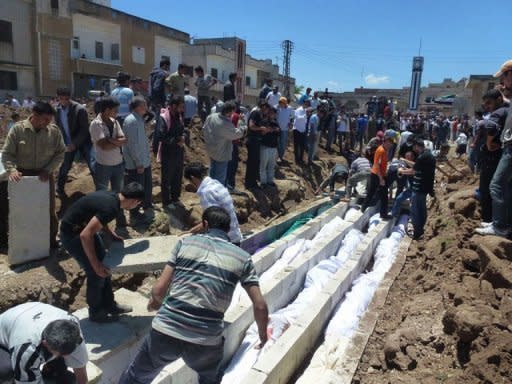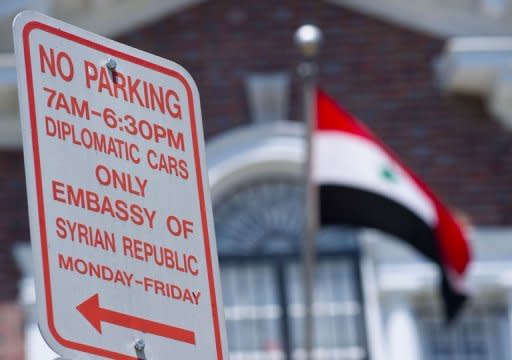Annan urges Assad to 'act now' as West expels envoys
International envoy Kofi Annan urged Syrian President Bashar al-Assad on Tuesday to "act now" to end 15 months of bloodshed, warning that the country had reached a "tipping point" as Western governments ordered out its top diplomats. The apparently coordinated expulsion orders issued by the European Union, the United States and other governments, including Australia, Canada and Switzerland, was in response to the killing of at least 108 people, nearly half of them children, during an assault by pro-government forces last week. Washington said it hoped the outcry over the deaths near the central town of Houla on Friday and Saturday would draw a change of heart from Damascus ally Moscow, which has previously blocked tougher UN action against Assad's regime. "We are at a tipping point," Annan said after his talks with the Syrian leader aimed at rescuing his troubled peace blueprint, that was supposed to begin with a ceasefire from April 12 that has never taken hold. "The Syrian people do not want the future to be one of bloodshed and division. Yet the killings continue and the abuses are still with us today," the former UN chief said. "I appealed to him for bold steps now -- not tomorrow, now -- to create momentum for the implementation of the plan. "This means that the government, and all government-backed militias, could stop all military operations and show maximum restraint." Annan flew into Damascus on Monday hours after the UN Security Council adopted a statement condemning heavy shelling of residential areas by government forces during the killings in Houla. The Syrian authorities have repeatedly insisted that the lion's share of the blame for the deaths lies with armed rebels, a position Assad restated in his talks with Annan on Tuesday. "The success of the Annan plan depends on the end of terrorist acts and those who support them and the smuggling of weapons," Assad was quoted as saying. But UN peacekeeping chief Herve Ladsous said that there were "strong" suspicions that a militia loyal to Assad had a hand in the killings. "There is strong suspicion that the Shabiha were involved in this tragedy in Houla," Ladsous told reporters at the UN headquarters. He added that the number of victims from an artillery barrage "points to responsibility of the government" as only Assad's forces have tanks and other artillery. Washington joined an array of Western governments in ordering out Syria's few remaining senior diplomats in protest at the killings. "We hold the Syrian government responsible for this slaughter of innocent lives," US State Department spokeswoman Victoria Nuland said, informing charge d'affaires Zuheir Jabbour that he had 72 hours to leave the country. French President Francois Hollande said Paris would also host a new meeting in July of the Friends of Syria group formed by Damascus's Arab and Western critics. He said he did not rule out military intervention, provided it were approved by the UN Security Council. "An armed intervention is not excluded on the condition that it is carried out with respect to international law, meaning after deliberation by the United Nations Security Council," he said in a television interview. -- 'Turning Point?' -- ---------------------- Russia, which has twice used its veto powers at the Security Council to block tougher action against Assad's regime, called for an "objective and impartial" UN-led probe into the killings. The United States said it hoped the results of the investigation would mark a "turning point" in Russia's stance towards it longtime ally. Washington welcomes the fact "that the Russians are willing to have a full investigation because we think it's undisputable what that investigation is going to show," the State Department spokeswoman said. "It's going to show that these were regime-sponsored thugs who went into villages, went into homes and killed children at point blank-range and their parents," Nuland said. "From that perspective, is this going to be a turning point in Russian thinking? We hope so." The opposition Syrian National Council welcomed the expulsion of diplomats but called on Western governments to go further and push for a UN Security Council resolution authorising the use of force. The world body should "adopt a resolution under Chapter VII (of the UN Charter) allowing the use of necessary force in order to put a stop to the genocide and the murders committed by the regime's militias," the SNC said. At least 30 people were killed in new violence on Tuesday as Annan held his talks in Damascus, the Syrian Observatory for Human Rights said. More than 13,000 people have been killed, most of them civilians, since the uprising against Assad's regime erupted in March last year, according to the Britain-based watchdog.





